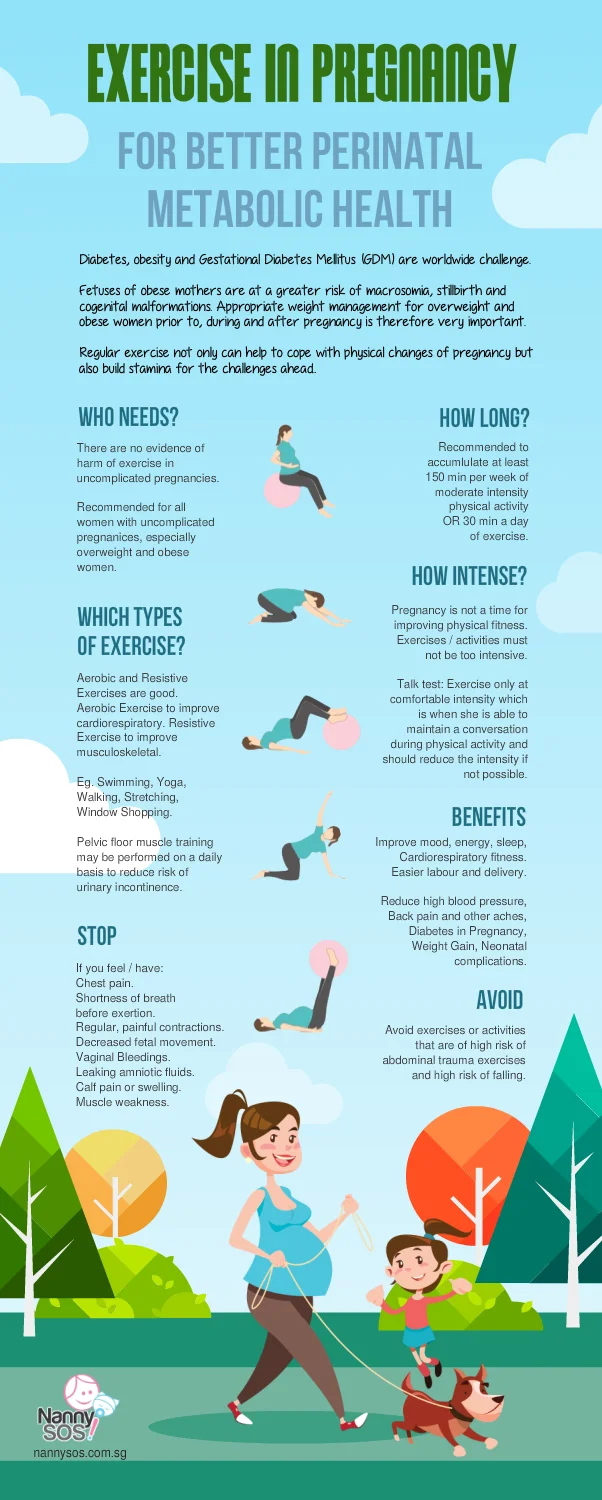Diabetes, obesity and gestational diabetes mellitus (GDM) has always been a worldwide challenge. The best preventive efforts start upstream from preconception and at conception in the womb to the early childhood years. A local study showed that excessive gestational weight gain (GWG) increases the risk of delivery by caesarean section, postpartum weight retention and having high-birthweight baby. Lifestyle interventions that include diet, physical activity and behavioral changes may reduce these risks by prevention of excessive weight gain. In general, more physical activity is associated with greater benefits and enhances physical and mental health. There are research into the effects of physical activity and exercise in pregnancy on GWG and pregnancy outcome which have shown an overall benefit on limiting GWG and preventing adverse maternal and fetal outcomes. However, practices vary and must be individualized with resources and limitations to the place of practice.
Guideline for Exercise in Pregnancy
There are guideline recommended for health care professionals involved in the holistic care of pregnant women regarding the safety, feasibility and acceptability of physical activity in pregnancy and the postpartum period.
Physical activity has minimal risks and should be encouraged in pregnancy.
Women can be reassured about the safety of physical activity by highlighting the benefits and lack of harm in uncomplicated pregnancies. Physical activity in uncomplicated pregnancies is not associated with miscarriage, stillbirth, fetal anomalies, preterm birth, preterm prelabour rupture of membranes or neonatal death. There are meta-analysis which showed that vigorous intensity exercise completed even into the 3rd trimester appears to be safe with no significant differences in small for gestational age, low birth weight or prematurity.
It is recommended for women to resume exercise in the post-partum period.
Physical exercise can be resumed gradually after delivery as soon as certified medicinally safe depending on mode of delivery and the presence of any complications. Pelvic floor exercises which reduce the risk of urinary incontinence can be initialed in the immediate postpartum period. There are evidences which has also shown that physical exercise can reduce postpartum weight gain and reduces the risk of deep vein thrombosis. In addition, regular aerobic exercise does not affect lactation or infant growth and can be safely continued in the post-partum period.
Recommended duration and exercise activities.
Women with uncomplicated pregnancies are recommended to engage in at least 20 to 30 minutes of moderate intensity physical activity per day, for a minimum of 3 days per week, but ideally on most days of the week. Physical activity should incorporate a variety of aerobic and resistance training activities for greater benefit. Examples of moderate intensity aerobic physical activity depending on fitness level, include: brisk walking, swimming, stationary cycling, low-impact aerobics, jogging, modified yoga and modified Pilates. Examples of resistance-training activities include body weigh exercises such as squats, lunges, and push-ups; exercise with light dumbbells, weights and resistance band exercises.
Progression of physical activity is best done in the second trimester. Moderate-intensity aerobic activity can be initiated at 3 times a week for 15 minutes per session. Progression of activity can be done by gradually increasing the frequency of sessions in a week, duration of each session, or intensity of each session. Rate of progression should be more gradual in those who are highly inactive and or unfit.
Exercises to be avoided.
However, certain activities are to be avoided in pregnancy. These include: contact sports such as basketball or soccer; sports with high risk of falls such as gymnastics and non-stationary cycling; sky diving due to unknown risks related to shock forces and low oxygen saturation; SCUBA diving due to the risk of decompression disease to the fetus; hot yoga and hot Pilates.
Precautions should also be adopted in prolonged or high-intensity exercise exceeding 45 minutes as this can result in hypoglycaemia. These precautions include adequate hydration, caloric intake prior to exercise or limiting each exercise session per day in a cool environment.

